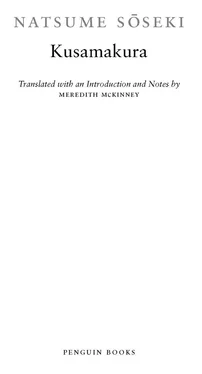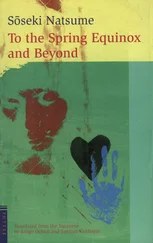Natsume Soseki - Kusamakura
Здесь есть возможность читать онлайн «Natsume Soseki - Kusamakura» весь текст электронной книги совершенно бесплатно (целиком полную версию без сокращений). В некоторых случаях можно слушать аудио, скачать через торрент в формате fb2 и присутствует краткое содержание. Жанр: Старинная литература, на английском языке. Описание произведения, (предисловие) а так же отзывы посетителей доступны на портале библиотеки ЛибКат.
- Название:Kusamakura
- Автор:
- Жанр:
- Год:неизвестен
- ISBN:нет данных
- Рейтинг книги:4 / 5. Голосов: 1
-
Избранное:Добавить в избранное
- Отзывы:
-
Ваша оценка:
- 80
- 1
- 2
- 3
- 4
- 5
Kusamakura: краткое содержание, описание и аннотация
Предлагаем к чтению аннотацию, описание, краткое содержание или предисловие (зависит от того, что написал сам автор книги «Kusamakura»). Если вы не нашли необходимую информацию о книге — напишите в комментариях, мы постараемся отыскать её.
Kusamakura — читать онлайн бесплатно полную книгу (весь текст) целиком
Ниже представлен текст книги, разбитый по страницам. Система сохранения места последней прочитанной страницы, позволяет с удобством читать онлайн бесплатно книгу «Kusamakura», без необходимости каждый раз заново искать на чём Вы остановились. Поставьте закладку, и сможете в любой момент перейти на страницу, на которой закончили чтение.
Интервал:
Закладка:
“No, not that girl. This one lived a long while ago.â€
“A long while ago? When would that have been?â€
“Oh, a very long while ago, believe me.â€
“And why did that girl from a long while ago throw herself in here?â€
“Wel , she was a beauty, you know, like the present girl is, sir. . . .â€
“Ah?â€
“And one day, one of them bonzes came along . . .â€
“You mean a begging monk?â€
“Yes, one of them bonzes that plays the bamboo flute and goes about begging. Wel , when he was staying over at Shioda’s place—he was the vil age headman at the time—that beautiful young girl fel head over heels for him. Cal it karma if you wil , but at al events she wept and declared she simply had to marry him.â€
“Wept, did she? Hmm.â€
“But headman Shioda wouldn’t hear of it. He said no bonze would be marrying his daughter. And in the end he cried, ‘Be off with you!’â€
“To the monk?â€
“That’s right. So then the young girl, she takes off after him and comes as far as the pool here—and throws herself in, right over there, where you can see that pine tree. And it al caused quite a stir, I can tel you. They say she was carrying a mirror on her, and that’s how this pool got its name.â€
“Wel , wel , so someone’s thrown themselves in here before, eh?â€
“A dreadful business, sir.â€
“How many generations back would it be, do you think?â€
“Al I can say is it’s a good long while ago. And I’l tel you another thing—wel , this is just between you and me, sir.â€
“What’s that?â€
“There’s been crazies in the Shiodas since generations back.â€
“Fancy that.â€
“It’s a curse, that’s what it is. And the present young lady too, everyone’s been looking askance lately and muttering about how she’s gone a bit peculiar.â€
“Surely that’s not so!†I exclaim with a laugh.
“You think not? But her mom was a bit peculiar, you know.â€
“Is she at home there?â€
“No, died last year.â€
“Hmm,†I say, and make no further comment, but simply watch the thin curl of smoke rising from the end of my cigarette. Heaving the bundle of firewood onto his back again, Genbei goes on his way.
I’ve come here to paint, but at this rate, with my head ful of such musings and my ear ful of such talk, days wil pass without me producing a single picture. Wel , I’ve set everything up, so at least I must go through the motions and make a preliminary sketch or two. The scenery of the opposite shore wil more or less do for what I want. I’l try my hand at it, just for form’s sake.
A blue-black rock towers ten feet or more into the air, straight up from the bottom of the pool; to the right of its sheer face, where the dark water lies in a curve at the jutting corner, dwarf bamboo crowds densely al the way down the steep mountainside to the very water’s edge. Above the rock a large pine tree at least three arm-spans thick thrusts its twisted, vine-clad trunk out at an angle that leans precariously half over the water.
Perhaps it was from this rock that the girl leaped, the mirror tucked in her bosom.
I settle myself before the easel and survey the elements of the scene—pine, dwarf bamboo, rock, and water. I can’t decide how much of the water to include. The rock and its shadow each measure about ten feet. One could almost believe that the luxuriance of dwarf bamboo extends beyond the water’s edge on down into the water, so vividly does its reflection seem to penetrate right to the bottom. As for the pine, it appears to soar as high as the eye can see, while the reflection it casts is likewise extremely long and thin. Reproducing the actual dimensions of what lies before me wouldn’t work as a composition. Perhaps it would be interesting to give up al thought of depicting the objects themselves and simply show their reflections. People would no doubt be startled to be shown a picture consisting only of water and the reflections in it. But it’s pointless simply to surprise the viewer; what must surprise them is the realization that this is successful as a picture. What to do ? I wonder, gazing intently at the surface of the water.
These weird shapes alone, however, simply don’t resolve into a composition. Perhaps I could plan my composition around a comparison of the real objects with their reflections, so I let my gaze move slowly and smoothly upward, from the tip of the rock’s reflection to the point where it meets the water’s edge, then slowly on up; my eyes savor that glistening shape and climb attentively on over each curve and crevice. When final y they have completed their ascent and have arrived at the perilous summit, I freeze in astonishment, like a frog suddenly caught in the glaring sights of a snake. The brush fal s from my hand.
There, vividly etched against the blue-black rock lit by the late spring sunlight, and framed from behind by the setting sun through green branches, is a woman’s face—the same one that first startled me beneath fal ing blossoms, then as a ghostly form entering my room, then as a figure in flowing wedding robes, and yet again through the steam of the bathhouse.
My eyes are pinned there, unable to move from that pale face; she too remains perfectly motionless, stretched to her ful supple height on the peak of the towering rock. What a moment it is!
Then without thinking, I spring to my feet. The woman twists swiftly about, and the next instant she is leaping away down the far side, with just a flash of what must be a red camel ia tucked at her waist. The light from the setting sun brushes the treetops, softly tingeing the pine tree’s trunk; the green of the dwarf bamboo intensifies.
She has astonished me yet again.
CHAPTER 11
I set off for a strol , to savor the soft dusk of this mountain vil age. Climbing up the stone steps of Kankaiji temple, my mind produces the fol owing lines for a poem in Chinese:
Counting the stars of spring
I gaze up—one, two, three . . .
I have no particular business with the abbot, nor any inclination to indulge in idle conversation with him. I’ve simply stepped out of the inn on impulse, letting my straying feet carry me where they wil , and found myself at the base of these stairs. I pause here awhile, to run my hand over the stone pil ar on which is carved the prohibition found at the entrance to every Zen monastery: “No alcohol or pungent vegetables permitted beyond this gate.†But then a sudden flood of happiness sets me climbing the stairs.
In Sterne’s novel Tristram Shandy the author claims that this book was written in the highest accordance with the wil of God. The first sentence was created by himself, he says; the rest simply came to him, written while his thoughts were fixed on the Lord. He had no plan of what to write: though it was he who wrote the words, the words themselves were the Lord’s, and therefore he holds no responsibility for them. Wel , my strol is of precisely this nature, though the irresponsibility is compounded in my case by the fact that I do not pray to God. Sterne managed very neatly to avoid responsibility by blaming it al on the Lord, while I, who have no God to take the blame on my behalf, simply cast mine into a passing ditch.
Nor do I exert myself in climbing the temple steps; indeed, if I found that the climb caused me any real effort, I would immediately give up. Pausing after I take the first step, I register a certain pleasure and so take a second. With the second step, the urge to compose a poem comes upon me. I stare in silent contemplation at my shadow, noting how strange it looks, blocked and cut short by the angle of the next stone riser, and this strangeness leads me to climb a further step. Here I look up at the sky. Tiny stars twinkle in its drowsy depths. There’s a poem here, I think, and so to the next step—and in this manner I eventual y reach the top.
Читать дальшеИнтервал:
Закладка:
Похожие книги на «Kusamakura»
Представляем Вашему вниманию похожие книги на «Kusamakura» списком для выбора. Мы отобрали схожую по названию и смыслу литературу в надежде предоставить читателям больше вариантов отыскать новые, интересные, ещё непрочитанные произведения.
Обсуждение, отзывы о книге «Kusamakura» и просто собственные мнения читателей. Оставьте ваши комментарии, напишите, что Вы думаете о произведении, его смысле или главных героях. Укажите что конкретно понравилось, а что нет, и почему Вы так считаете.












